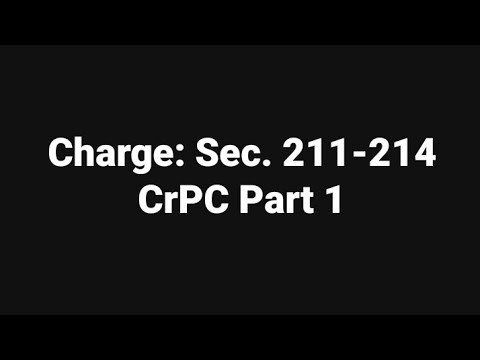Overview of CHARGE (ALLEGATIONS) under CRPC
Introduction
The charge is the establishment of the allegation(s) against the accused in a criminal case. The inspiration behind a charge is to inform an accused individual, precisely and succinctly of the issue with which he is charged. It must pass on to him with adequate clearness and certainty, what the prosecution expects to prove against him and which he should protect. The fundamental principle of criminal law is that the accused ought to be informed with certainty and precision the exact nature of the charge leveled against him.
Object
The object is to give the accused notice of the offense he is charged with and does not touch jurisdiction.
Charge – Definition and Meaning
The charge is an accusation. Section 2 (b) of the Cr.P.C which reads as follows:- “ 2. Definitions. – In this Code, unless the context otherwise requires, – (b) charge includes any head of the charge when the charge contains more head than one”. According to Section 2 (b) of Cr.P.C, when a charge contains more than one heads, the head of charges is likewise a charge.
The Legal Provisions
The provisions regarding it are contained in Section 211 to 224 (Chapter XVII), 227, 228, 239, 240 and 464 of the Code of Criminal Procedure.
Nature of charge
It should be precise in its scope and particular in its details.
Contents and Essentials of a Charge
A charge must contain the following contents –
- Offence to be stated – In a charge sheet, the offense must be expressed, so that the accused may shield him.
- Description of Offence by Name – The Charge ought to depict offense by name which is given by that the creates an offense.
- Definition of offense – Where the criminal law does not give any specific name to the offense than a definition/ meaning of the offense must be expressed.
- Law or Section of Law – A charge must contain the law or the section of the law against which the offense is asserted to have been committed.
- Compliance with substantive Requirements of offense – The charge must fulfill the requirements of offense, i.e., which it must not come within the exceptions, or if it comes, then it must be mention in it.
- The language of the Charge – The charge shall be framed in English or the Court’s language or the language understandable by an accused.
- Previous conviction of the accused – Where the accused is liable to enhanced punishment by virtue of his previous conviction and such previous conviction has to be proved; such charge might state the fact, date, and place of the previous conviction.
- Particulars as to time Place and Person – It is necessary that charge ought to contain Time of offense, Place of offense, Person against whom the offense was committed and Thing against whom the offense was committed.
- Particulars of the Manner of the alleged offense – Where the particulars above are not sufficient to give notice of the offense with which the accused is charged, the charge shall likewise contain the particulars of the way in which the alleged offense was committed.
- Thing is Respect of which offense was committed – A charge should express the property in respect of which not is said to have been taken place, for example where an offense is committed under Arms Ordinance, details of the arms recovered from the house of the accused must be stated in the charge.
Impact of a defective charge
The matter has been provided in Sections 215 and 464 of the Code of Criminal Procedure (as amended up to date). The two sections read together to lay down that whatever the anomaly in the framing of a charge; it is not deadly unless there is a bias caused to the accused. If the vital information is conveyed to him and no harm is caused to him because of the charges, the accused cannot prevail by only showing that the charges framed were defective.
Change and Altered / Amendment
Whenever before pronouncement of judgment, the charge can be altered or added. However, it is essential that charge can only be altered on justification by material on record, and that every such alteration or addition ought to be pursued and explained to accused.
Role of Accused
At the time of framing charge, the accused has no privilege to produce any material. In the event that the contention of the accused is accepted, there would be a mini-trial at the stage of framing of charge. That would vanquish the object of the Code.
Discharge
Sections 239 and 240 of Cr.P.C. are to be read together. If upon consideration of all the documents alluded to in Section 173 Cr.P.C. and examining the accused, if considered important by the Magistrate and also after hearing both sides, the Magistrate considers the charge as baseless, he must discharge the accused.
Interlocutory Order
The order of framing of the charges is purely interlocutory as it does not terminate the proceedings, but the trial goes on until it culminates in acquittal or conviction. Without a doubt, if the court refused to frame charges and discharged the accused, the proceedings would have ‘terminated’ but that is only one side of the picture. The other side of the picture is that if the court declined to discharge the accused and framed charges against him, then the order would be interlocutory on the grounds that the trial would still be alive.
Conclusion
The charge is an essential step in a criminal proceeding. It isolates the inquiry stage from the trial. The charge is a first notice to accused of his offense; it should convey to him in sufficient clearness and certainty what the prosecution intends to prove and which case the accused is to meet. At the phase of framing charge, the court exercises a limited jurisdiction. It would just need to see with respect to whether a prima facie case has been made out.
Also Read:






